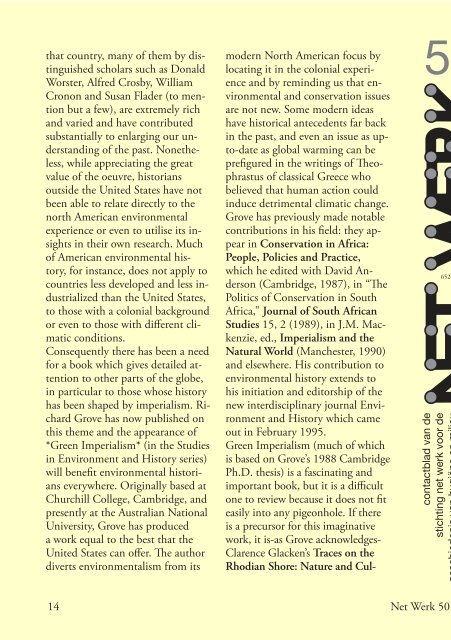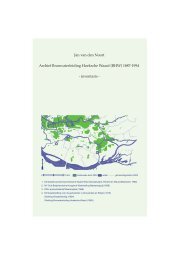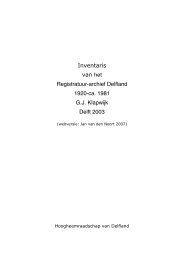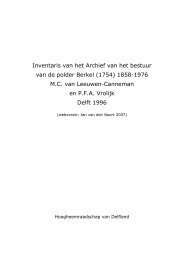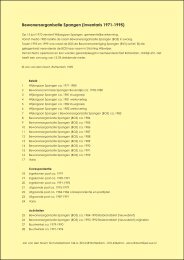Net Werk voor de Geschiedenis van Hygiëne en Milieu, 1994-1996 ...
Net Werk voor de Geschiedenis van Hygiëne en Milieu, 1994-1996 ...
Net Werk voor de Geschiedenis van Hygiëne en Milieu, 1994-1996 ...
Create successful ePaper yourself
Turn your PDF publications into a flip-book with our unique Google optimized e-Paper software.
that country, many of them by distinguished<br />
scholars such as Donald<br />
Worster, Alfred Crosby, William<br />
Cronon and Susan Fla<strong>de</strong>r (to m<strong>en</strong>tion<br />
but a few), are extremely rich<br />
and varied and have contributed<br />
substantially to <strong>en</strong>larging our un<strong>de</strong>rstanding<br />
of the past. Nonetheless,<br />
while appreciating the great<br />
value of the oeuvre, historians<br />
outsi<strong>de</strong> the United States have not<br />
be<strong>en</strong> able to relate directly to the<br />
north American <strong>en</strong>vironm<strong>en</strong>tal<br />
experi<strong>en</strong>ce or ev<strong>en</strong> to utilise its insights<br />
in their own research. Much<br />
of American <strong>en</strong>vironm<strong>en</strong>tal history,<br />
for instance, does not apply to<br />
countries less <strong>de</strong>veloped and less industrialized<br />
than the United States,<br />
to those with a colonial background<br />
or ev<strong>en</strong> to those with diff er<strong>en</strong>t climatic<br />
conditions.<br />
Consequ<strong>en</strong>tly there has be<strong>en</strong> a need<br />
for a book which gives <strong>de</strong>tailed att<strong>en</strong>tion<br />
to other parts of the globe,<br />
in particular to those whose history<br />
has be<strong>en</strong> shaped by imperialism. Richard<br />
Grove has now published on<br />
this theme and the appearance of<br />
*Gre<strong>en</strong> Imperialism* (in the Studies<br />
in Environm<strong>en</strong>t and History series)<br />
will b<strong>en</strong>efi t <strong>en</strong>vironm<strong>en</strong>tal historians<br />
everywhere. Originally based at<br />
Churchill College, Cambridge, and<br />
pres<strong>en</strong>tly at the Australian National<br />
University, Grove has produced<br />
a work equal to the best that the<br />
United States can off er. Th e author<br />
diverts <strong>en</strong>vironm<strong>en</strong>talism from its<br />
mo<strong>de</strong>rn North American focus by<br />
locating it in the colonial experi<strong>en</strong>ce<br />
and by reminding us that <strong>en</strong>vironm<strong>en</strong>tal<br />
and conservation issues<br />
are not new. Some mo<strong>de</strong>rn i<strong>de</strong>as<br />
have historical antece<strong>de</strong>nts far back<br />
in the past, and ev<strong>en</strong> an issue as upto-date<br />
as global warming can be<br />
prefi gured in the writings of Th eophrastus<br />
of classical Greece who<br />
believed that human action could<br />
induce <strong>de</strong>trim<strong>en</strong>tal climatic change.<br />
Grove has previously ma<strong>de</strong> notable<br />
contributions in his fi eld: they appear<br />
in Conservation in Africa:<br />
People, Policies and Practice,<br />
which he edited with David An<strong>de</strong>rson<br />
(Cambridge, 1987), in “Th e<br />
Politics of Conservation in South<br />
Africa,” Journal of South African<br />
Studies 15, 2 (1989), in J.M. Mack<strong>en</strong>zie,<br />
ed., Imperialism and the<br />
Natural World (Manchester, 1990)<br />
and elsewhere. His contribution to<br />
<strong>en</strong>vironm<strong>en</strong>tal history ext<strong>en</strong>ds to<br />
his initiation and editorship of the<br />
new interdisciplinary journal Environm<strong>en</strong>t<br />
and History which came<br />
out in February 1995.<br />
Gre<strong>en</strong> Imperialism (much of which<br />
is based on Grove’s 1988 Cambridge<br />
Ph.D. thesis) is a fascinating and<br />
important book, but it is a diffi cult<br />
one to review because it does not fi t<br />
easily into any pigeonhole. If there<br />
is a precursor for this imaginative<br />
work, it is-as Grove acknowledges-<br />
Clar<strong>en</strong>ce Glack<strong>en</strong>’s Traces on the<br />
Rhodian Shore: Nature and Cul-<br />
50<br />
652-653<br />
contactblad <strong>van</strong> <strong>de</strong><br />
stichting net werk <strong>voor</strong> <strong>de</strong><br />
geschie<strong>de</strong>nis <strong>van</strong> hygiëne <strong>en</strong> milieu<br />
redactie: myriam d a r u<br />
webversie: jan <strong>van</strong> <strong>de</strong>n n o o r t<br />
ture in Western Th ought, From<br />
Anci<strong>en</strong>t Times to the End of the<br />
Eighte<strong>en</strong>th C<strong>en</strong>tury (Berkeley, California,<br />
1967) or perhaps the total<br />
histories of the annalist Fernand<br />
Brau<strong>de</strong>l.<br />
In terms of subject matter, sources<br />
consulted and un<strong>de</strong>rlying i<strong>de</strong>ological<br />
impulses, Gre<strong>en</strong> Imperialism<br />
is extremely wi<strong>de</strong>-ranging. Th e<br />
book’s long sub-title, while perhaps<br />
unwieldy, is nee<strong>de</strong>d to indicate the<br />
c<strong>en</strong>tral themes of the cont<strong>en</strong>ts. Th e<br />
overarching argum<strong>en</strong>t which Grove<br />
<strong>de</strong>velops by using specifi c examples<br />
is that the expansion of Europe has<br />
be<strong>en</strong> critical both to the <strong>de</strong>velopm<strong>en</strong>t<br />
of practical state <strong>en</strong>vironm<strong>en</strong>tal<br />
policy as we un<strong>de</strong>rstand it today,<br />
and to <strong>en</strong>vironm<strong>en</strong>tal epistemology.<br />
Grove explores the interplay<br />
betwe<strong>en</strong> the metropole and the<br />
expanding colonial periphery and<br />
shows how curr<strong>en</strong>t i<strong>de</strong>as about the<br />
natural world have evolved from<br />
these circumstances.<br />
Using insights from postmo<strong>de</strong>rn literary<br />
theory, Marxian class analysis,<br />
resource economics and many other<br />
disciplines, Grove traces the origins<br />
of mo<strong>de</strong>rn <strong>en</strong>vironm<strong>en</strong>tal concern<br />
-intellectually, culturally and practically<br />
- to European expansion in<br />
g<strong>en</strong>eral, but especially to contact<br />
with islands and tropical biota. He<br />
explains the importance of islands<br />
in European culture, extracting<br />
information from Shakespeare,<br />
Daniel Defoe, Darwin, and also<br />
from the archives in places as varied<br />
as Lyons, Brest, Bangalore, Mauritius,<br />
St Vinc<strong>en</strong>t, Pretoria, Trinidad<br />
and Tobago, Cambridge and Kew.<br />
Th e importance of islands, as Grove<br />
explains it, is that being isolated<br />
and relatively small, they rapidly<br />
and dramatically <strong>de</strong>monstrated<br />
the mechanisms and processes of<br />
ecological change brought about by<br />
European p<strong>en</strong>etration, thus g<strong>en</strong>erating<br />
theoretical <strong>en</strong>quiry about such<br />
matters and impacting upon <strong>en</strong>vironm<strong>en</strong>tal<br />
policy.<br />
Th e book comprises eight chapters;<br />
the fi rst is an overview, while the<br />
others analyze places as diverse as<br />
tropical India, St Hel<strong>en</strong>a, the Cape<br />
of Good Hope, Mauritius, and the<br />
Caribbean, relating their <strong>en</strong>vironm<strong>en</strong>tal<br />
histories to the aims and experi<strong>en</strong>ces<br />
of various colonizing and<br />
controlling joint-stock <strong>en</strong>terprises<br />
(English, Dutch and Fr<strong>en</strong>ch) and<br />
later colonial states. Th ese institutions<br />
are not elevated to powerful<br />
monolithic impersonal structures,<br />
because Grove evaluates organizational<br />
<strong>en</strong><strong>de</strong>avour against the very<br />
real transformations which individuals<br />
have be<strong>en</strong> able to make. It is<br />
both chall<strong>en</strong>ging and novel to have<br />
a scrutiny of the careers of hitherto<br />
little known company surgeons and<br />
embryonic naturalists and sci<strong>en</strong>tists<br />
working in diff er<strong>en</strong>t regions, and it<br />
is certain that Gre<strong>en</strong> Imperialism<br />
will stimulate other historians to<br />
work in this fi eld. Moreover, this<br />
14 <strong>Net</strong> <strong>Werk</strong> 50 - maart <strong>1996</strong><br />
14/15<br />
14<br />
15


